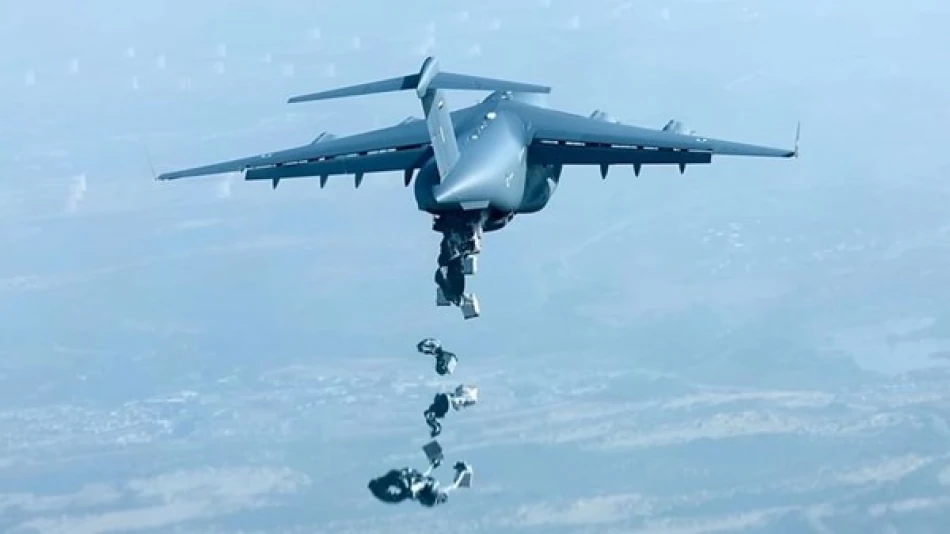
UAE Airdrops Aid Over Gaza for Third Consecutive Day in 'Operation Goodwill Birds'
UAE Delivers 56th Consecutive Airdrop to Gaza as Humanitarian Crisis Deepens
The United Arab Emirates has conducted its 56th humanitarian airdrop over Gaza's isolated areas, marking the third consecutive day of intensified relief operations under the "Birds of Goodness" initiative. Working alongside Jordan, the UAE has now delivered nearly 3,763 tons of essential supplies using 195 aircraft, highlighting the Gulf nation's growing role as a regional humanitarian leader while traditional aid corridors remain severely constrained.
Operation Noble Knight 3: A Strategic Humanitarian Response
The latest airdrops form part of "Operation Noble Knight 3," the UAE's systematic approach to addressing Gaza's humanitarian emergency. This operation represents a significant escalation in the Emirates' relief efforts, with the frequency and scale of deliveries reflecting the deteriorating conditions on the ground.
The operation specifically targets areas that have become inaccessible through traditional land-based delivery routes due to ongoing security challenges. This strategic focus on isolated zones demonstrates the UAE's understanding of Gaza's fragmented geography and the need for innovative delivery mechanisms.
Scale and Scope of Relief Operations
The numbers reveal the magnitude of the UAE's commitment: nearly 4,000 tons of food and basic relief materials delivered through nearly 200 flights. This scale places the Emirates among the most active humanitarian actors in the current Gaza crisis, rivaling efforts by traditional donors and international organizations.
The sustained nature of these operations—with daily airdrops now routine—suggests the UAE has developed robust logistical capabilities for such missions, likely drawing on its military aviation expertise and regional partnerships.
Regional Diplomacy Through Humanitarian Action
The UAE's partnership with Jordan in these operations reflects broader regional diplomatic calculations. Jordan's participation provides crucial legitimacy and operational support, given its historical ties to Palestinian territories and its strategic position as a moderate Arab voice.
This collaboration also demonstrates how Gulf states are increasingly using humanitarian initiatives to project soft power and establish diplomatic credibility on Palestinian issues—traditionally dominated by other regional actors.
Comparison with Global Humanitarian Responses
The UAE's airdrop strategy mirrors approaches used in other conflict zones, from Afghanistan to Syria, where traditional aid delivery has become impossible. However, the consistency and scale of the Emirates' operations distinguish it from ad-hoc international responses.
Unlike the more politically constrained approaches of some Western donors, the UAE's direct action model allows for rapid deployment without lengthy bureaucratic processes, though it also raises questions about coordination with broader international relief efforts.
Implications for UAE's Regional Standing
These operations serve multiple strategic purposes beyond immediate humanitarian relief. They position the UAE as a reliable partner for Arab populations during crises, potentially strengthening its influence across the region.
The initiative also demonstrates the Emirates' operational capabilities and willingness to take independent action on regional issues, reinforcing its image as a pragmatic, solutions-oriented player in Middle Eastern affairs.
Long-term Humanitarian Infrastructure
The sustained nature of these operations suggests the UAE is building long-term humanitarian delivery capabilities that could be deployed in future regional crises. This infrastructure development represents a significant investment in the Emirates' soft power projection capabilities.
The emphasis on reaching "isolated areas" also indicates sophisticated intelligence and planning capabilities, suggesting these operations involve considerable strategic planning rather than simple relief distribution.
Most Viewed News

 Layla Al Mansoori
Layla Al Mansoori






